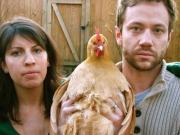On the Table
Sojourn Theatre’s 2010 project On the Table is a participatory performance that bridged two Oregon communities, one urban (Portland), one rural (Mollala) with the aim to shift people’s attitudes about the places where they live. The performance required the audience to participate in inter-city travel, public dialogue, video and involvement within the performance itself, including a bus trip, a wedding and a meal. The concept goes beyond metaphorical bridge building to physically move audiences across geographic boundaries. "We've taken on lots of projects that have some kind of bridge impulse in them," Sojourn artistic director Michael Rohd told American Theatre magazine. "We want to bring people into contact who aren't generally connected with each other." Opening in summer 2010, On the Table involved 18 months of research and interviews in Portland and Molalla. The project was created with the help of Molalla's Arts Commission, the City of Portland and numerous local and statewide organizations. On the Table began with two separate 45-person audiences, one in Portland (population 582,130), one in Molalla (population 7,800). Each audience watched the first act of the show, a recreation of a 1980 memorial service for a prominent community member. Then both groups boarded buses to Oregon City, experiencing the second act during the bus ride where Sojourners pass out cell-phone numbers and the urban and rural audience members called each other to discuss what had happened so far. When they arrived in Oregon City (once the end of the Oregon Trail), they met face-to-face and celebrated a wedding over elk stew and other Oregon foods, everyone offering toasts to the urban and rural bride and groom. Rohd asked during the reception, “What if everyone in Oregon committed to one another in a great civic marriage?” American Theatre magazine’s Mark Blankenship points to the meal as central to the project’s intent: That last bit is crucial. Rohd wants the two communities to be forced to interact over dinner. "We have this idea that breaking bread is automatically a communal activity, but I would suggest that most people break bread with people who are like them," he says. "I don't think the action of food necessarily brings people together—you might see people unlike you in a serving line, but you don't connect with them. You don't sit down with them." Rohd expands that idea to the theatre. "One thing that gets said a lot about theatre is that a bunch of people come into a room and they laugh and they cry together in the dark, and that builds community. But I'm starting to think that's bullshit. People crave something that involves more than sitting and watching." Upon attending both urban and rural performances in early July 2010, Marty Hughley, a reporter from The Oregonian wrote: …the discussions were friendly and animated. A vegetarian wound up at the same table with elk rancher Alan Ross, and their discussion convinced her to try the stew. And even if Sunday night’s Molalla crowd was largely made up of Portlanders who’d opted for the rural perspective, the experience was eye-opening. Portland Mercury reporter Alison Hallett added: Participatory theater done wrong can be at best arrogant and at worst excruciatingly uncomfortable. But Sojourn's got a track record of making this kind of thing work—witness Built, in which audience members took fake condo tours of the South Waterfront, snacked on fresh melon and cookies, and ultimately worked together to design their own ideal built environment. Audiences can expect a tightly orchestrated, facilitated experience that nonetheless allows room for discourse—and some pretty good Mexican food, too; all in the service of examining, as Rohd puts it, "How you define place, and how place defines you." Director: Michael Rohd Collaborating Director: Robert Leonard
